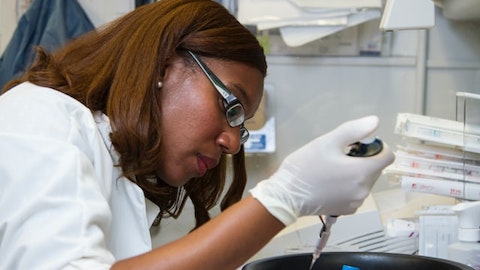Jennifer Buell : Okay. So Mayank, thank you very much for the questions. I will say on the last part and this is specific to the platform trial I just mentioned. There’s an infrastructure in the capability in existence and we’ve been invited to – and we actually are an active contract negotiations to join a program that would be quite large and we’re going to be able to provide a very detailed update upon contract execution. Now this is a trial that will be these operational costs will be covered. The platform and sites and centers are in existence. And the leadership of this platform are world experts and very high profile individuals. So we were not only thrilled to have the opportunity to be invited to this platform program, but also to the potential that it does offer to independently generate the data that may be supportive of a registrational program with 797.
So, I will provide very much more detail on this and the moment that we conclude the contract execution. With respect to autoimmunity, now Jack a moment ago asked about our trial advancement in GVHD, an area that we’ve been very interested in advancing. And we’re continuing to do so. Now this would be something that we are pursuing aggressively external funding. We have a few options that are coming to fruition now that will allow us to execute on the trial. That’s already been designed including with investigators identified and willing and contributing to the trial design and willing to execute. So that’s one component of other immune-related diseases in addition to the ARDS. Now, as you know, these cells we have – last after in SITC 2022, we presented an R&D Day, and we had a world leader in metabolic diseases and disorders and an expert in iNKT cell biology.
And the potential of these cells to leverage their features and I could have Marc speak a bit to this in modulating immunity and addressing metabolic-related disorders is immense. It’s something that we have the capability to produce material for large populations of patients. And we also have been entertaining some discussions with partners on the development of these cells in this area. I’m going to have Marc to say two or three words about the potential in this particular space. And finally, I also should mention and I have previously, we can we are engaged and have been engaged with the government given for financing some of the programs that we have going, going forward because as you know respiratory distress is debilitating and it is debilitating not only for individuals, but also for our economy and it presents – it falls into a category that’s considered a national threat.
So this is an area that we will continue to work with our government collaborators to support initiatives that are necessary to protect our national security. Marc, maybe just a moment on the metabolic opportunity?
Marc Van Dijk : Yeah. And also more broadly the autoimmune opportunity and we’ve been looking at this and Agenus is an antibody company, MiNK came out of an antibody company because there is an unmet need. You can only address so many parameters with an antibody and a cell has intrinsically many more response mechanisms to its delivery arsenal. And this is quite important in diseases such as cancer and autoimmunity and metabolic disorders, because these are multifactorial an antibody can do one thing, can do many things and combination of antibodies but cells have an infinitely more complex response mechanism and ability to influence. And being variant iNKT cells are actually tissue residents immune orchestrators. They actually are to modulate and rebalance the immune system and a lot of these indications that we’ve now been pursuing ARDS, as well as graft versus host disease.
They have an intrinsic immune disbalance that you are aiming to restore with iNKT cells. And these cells are able to release soon as in COVID patients and in some of our emergency use patients, it has a dramatic effect in restoring sort of immune normal functions. And we also think that in metabolic disorders, we can actually achieve this. We’ve seen iNKT cells are getting into places where conventional T cells don’t really like to be. And iNKT cells can go there and do change the environments much more to a much more stable and rebalance situation. That’s what we’re looking for and there are many new disorders where we feel this will be a benefit. I think I’ll leave it at that.
Mayank Mamtani : Yeah, look forward to learning more on that. Thank you. And then on the phase 2 gastric campus study, just early findings – I understand there – could you talk specifically to your plan of understanding contribution between bot/bal and the cells being through clinical or translation data? I’m not sure if you’ve seen a ton of bot/bal data in this particular cold tumors. So if you could help us understand how you’re thinking about that, Jen? Thanks again for taking my questions.
Jennifer Buell : Mayank, thank you very much. So I had mentioned to Emily just a bit ago about the way that we will interrogate the activity of these cells. So for standard of care, thousands of patients’ worth of data, we did not add in a standard of care arm into the randomized Phase 2. We didn’t – we don’t need to at this point. So, we will study the cells on top of standard of care. The cells on top of bot/bal with and without standard of care. Now, our ability to interrogate the addition of the additional benefit of the contribution of the cells to bot/bal is going to take shape in a few ways. It’ll take shape in this study. But it also will take shape in a study that we will be announcing, as well that will be externally funded in colorectal cancer in patients with metastatic disease to deliver.


